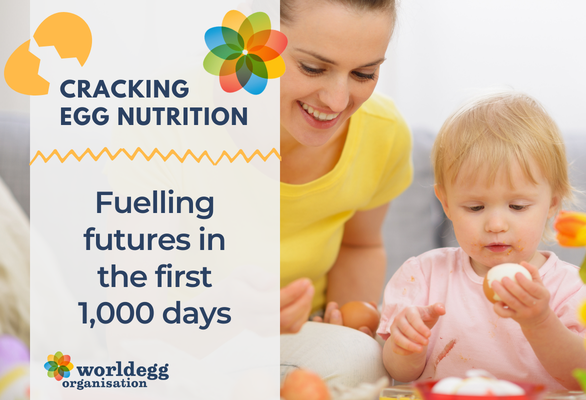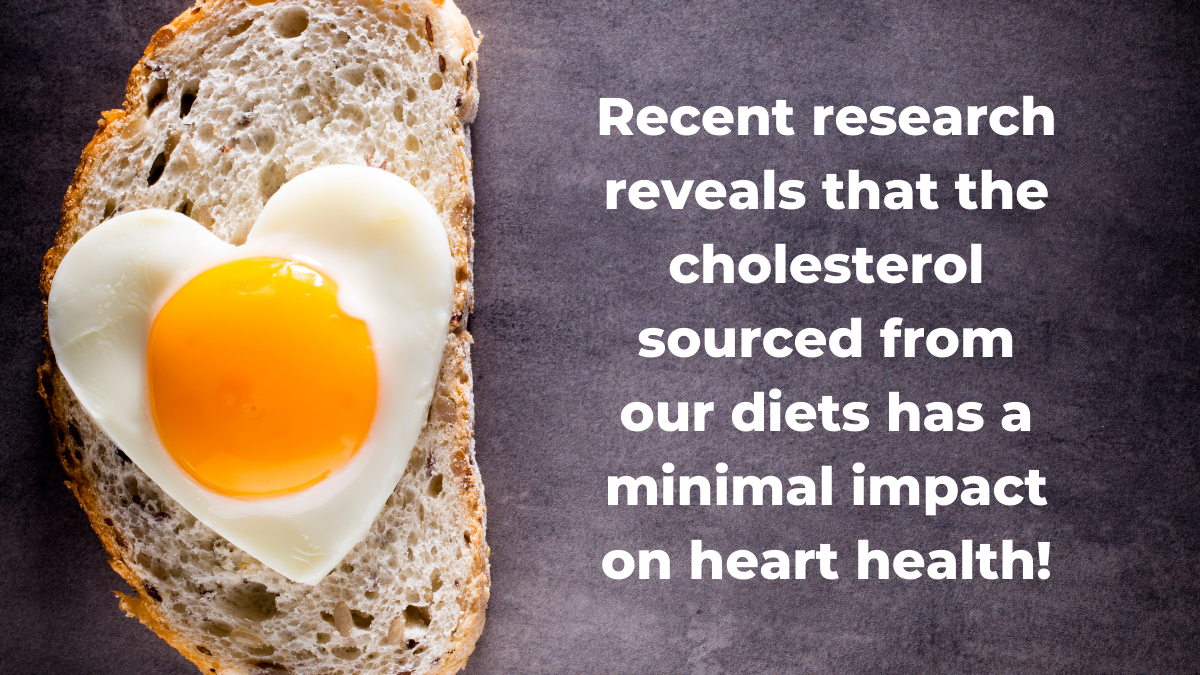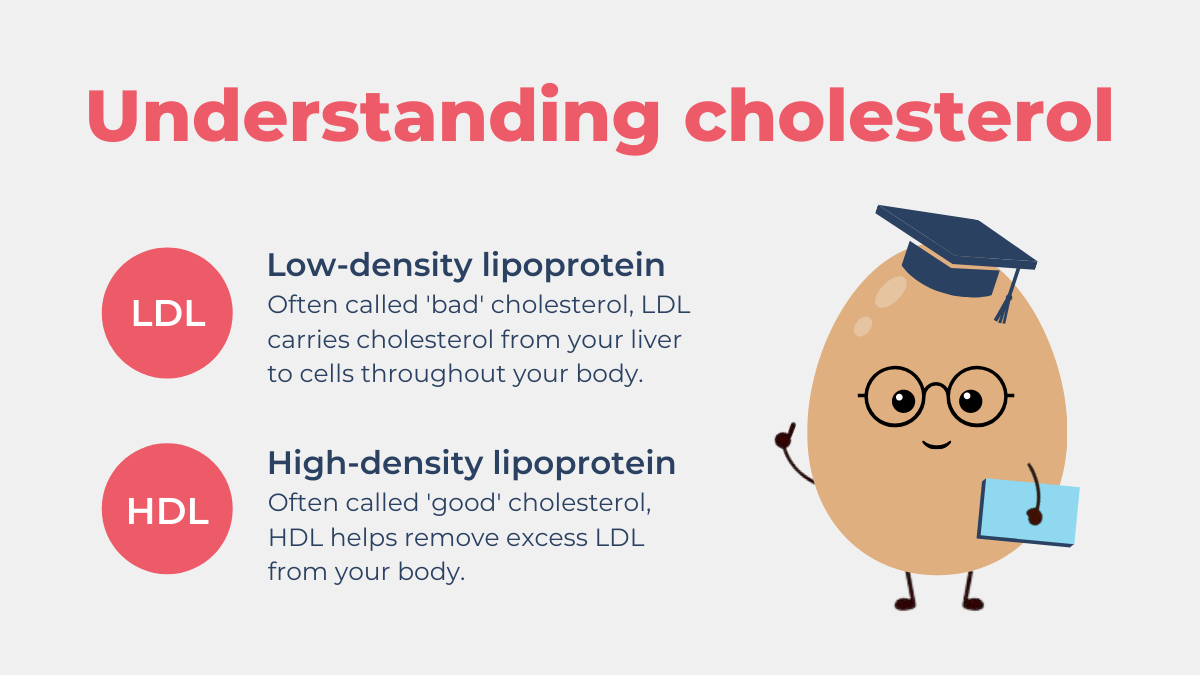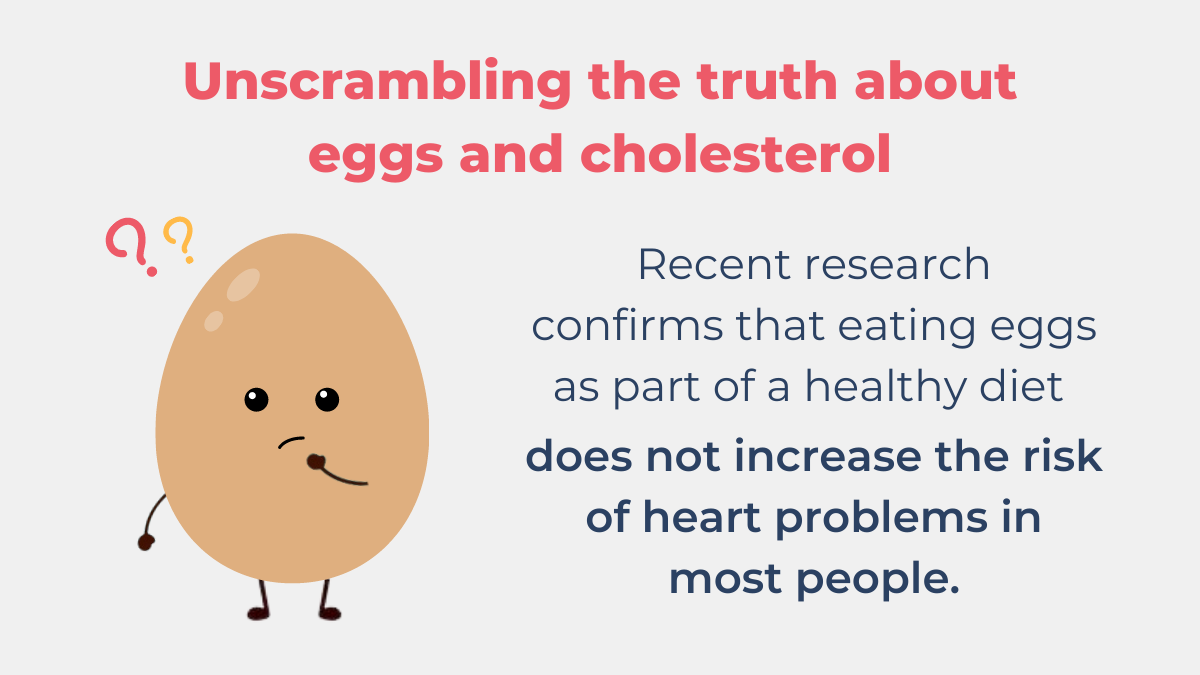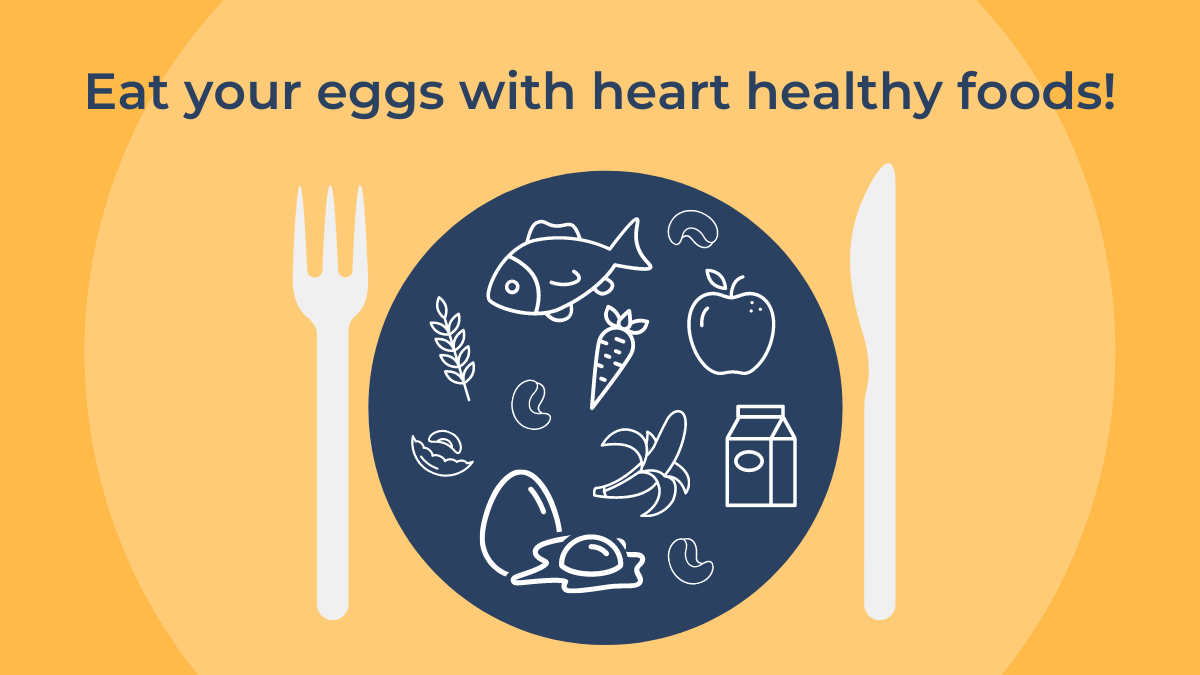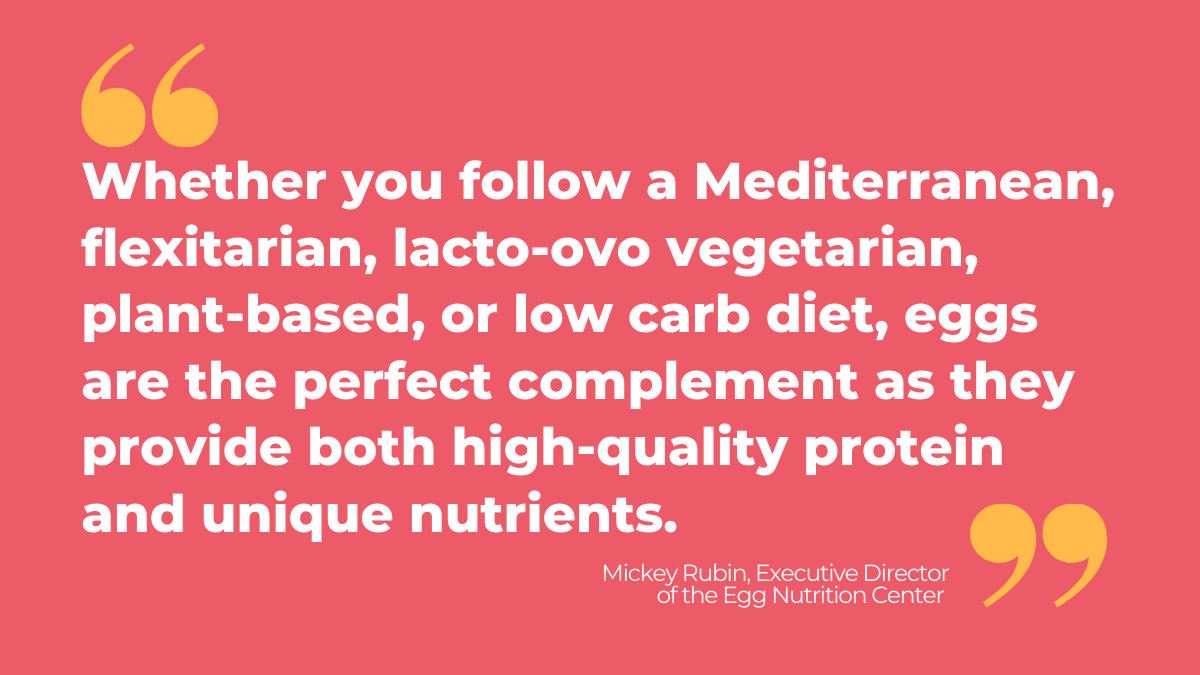Cracking Egg Nutrition: Unscrambling the truth about eggs and cholesterol
Historically, eggs have had a bad reputation when it comes to cholesterol. However, recent scientific research has revealed that the cholesterol sourced from our diets has a minimal impact on heart health. Despite this, many still believe certain foods, like eggs, can negatively affect our blood cholesterol levels and pose a risk to our wellbeing. But do we really understand what cholesterol is? And do eggs actually increase our risk of heart disease? It is time to crack this myth and unscramble the truth about eggs and cholesterol.
What is ‘cholesterol’?
Cholesterol is a type of lipid – a waxy substance that forms an important part of your cells, helping your body function properly1.
Dr Mickey Rubin PHD, member of the International Egg Nutrition Centre’s (IENC) Global Egg Nutrition Expert Group and Executive Director of the Egg Nutrition Center (ENC) in the USA expands: “Cholesterol is an important component of cells, essential for production of hormones such as oestrogen and testosterone2, and important for digesting foods3.”
Cholesterol comes from two sources; most is produced within the body (blood cholesterol), and a smaller portion is obtained through some of the foods we eat (dietary cholesterol)1,4.
Why is cholesterol bad?
While cholesterol is essential for bodily function, having too much of it in the bloodstream can increase the risk of heart disease. High blood cholesterol levels can lead to fatty deposits building up in blood vessels, which may eventually break off and form clots that may cause a heart attack or stroke1.
However, not all cholesterol is necessarily bad. There are two types; low-density lipoprotein (LDL) cholesterol and high-density lipoprotein (HDL) cholesterol. LDL cholesterol (otherwise known as ‘bad’ cholesterol) is associated with an increased risk of heart disease5.
Research shows that the cholesterol that comes from the foods you eat has a minimal impact on LDL (‘bad’) cholesterol levels6. This is because the body naturally regulates the amount of cholesterol that circulates in the blood, so when you eat more cholesterol from food, your body produces less cholesterol to compensate. In fact, HDL (‘good’) cholesterol helps to protect you from heart disease by removing excess cholesterol from your arteries and carrying it back to the liver7.
Dr Rubin explains: “Individual responses to cholesterol in foods vary widely, but even in people who ‘respond’ to dietary cholesterol, there is an increase in HDL (‘good’) cholesterol along with an increase in LDL (‘bad’) cholesterol. The resulting ratio of HDL to LDL does not change, which is an important assessment for evaluating risk8.”
Unscrambling the egg myth
One large egg contains around 185mg of cholesterol9, which is predominantly found within the yolk. For years, egg yolks have been widely considered bad for heart health, due to the high levels of dietary cholesterol they contain. But since dietary cholesterol has little impact on blood cholesterol in most people, this myth can finally be cracked!
The latest research confirms that eating eggs as part of a healthy diet does not have a significant effect on blood cholesterol, and therefore does not increase the risk of heart disease in most people10–13.
In fact, heart health representatives around the world have amended their recommendations for consumption of eggs for health. For example, the National Heart Foundation of Australia no longer recommends a limit on the number of eggs healthy Australians can eat, and advises that type 2 diabetes sufferers can eat up to 7 eggs per week14.
Similarly, the American Heart Association recommends healthy individuals can include up to a whole egg daily in healthy diet patterns, and up to two eggs per day is recommended for aging adults6.
Furthermore, current dietary guidelines by leading Canadian health organisations including the Canadian Cardiovascular Society, the Heart and Stroke Foundation and Diabetes Canada do not provide a limit on dietary cholesterol for healthy adults15–17.
What is really to blame?
If cutting down your egg intake is not the answer, what is? The truth is, saturated fat has a greater impact on blood cholesterol levels than dietary cholesterol. So, it is not the eggs themselves, but what you eat with them that you need to look out for!
“Saturated fat intake is related to increased blood cholesterol levels, and while eggs are not high in saturated fat, it is important to select healthy foods to eat with eggs,” explains Dr Rubin.
Eggs should be eaten as part of a varied diet alongside foods that are good for heart health, such as fish, fruit, vegetables, whole grains, dairy foods, nuts and legumes1,18.
Dr Rubin adds: “You can also improve your blood cholesterol levels through modification of a variety of lifestyle factors. It is recommended to do some form of physical activity every day, do not smoke or use tobacco products, talk frequently with your healthcare provider, and arrange regular cholesterol screenings.”
We have cracked it!
Since the cholesterol you eat in foods is unrelated to blood cholesterol levels in most healthy people, eggs are no longer considered a danger when it comes to heart disease, when eaten as part of a healthy balanced diet.
“Whether you follow a Mediterranean, flexitarian, lacto-ovo vegetarian, plant-based, or low carb diet, eggs are the perfect complement as they provide both high-quality protein and unique nutrients,” Dr Rubin summarises.
References
2 Institute of Medicine (2005)
3 Centers for Disease Control and Prevention
4 Blesso CN, Fernandez ML (2018)
13 BMJ (2020)
14 National Heart Foundation of Australia
15 Canadian Cardiovascular Society
16 The Heart and Stroke Foundation of Canada
18 USDA
Promote the power of the egg!
To help you promote the nutritional power of the egg, the IEC has developed a downloadable industry toolkit, including key messages, a range of sample social media posts, and matching graphics for Instagram, Twitter and Facebook.
Download the industry toolkit (Spanish)About Dr Mickey Rubin
Mickey Rubin, PhD, is a member of the International Egg Nutrition Centre’s (IENC) Global Egg Nutrition Expert Group and Executive Director of the Egg Nutrition Center (ENC) in the United States. He is passionate about nutrition science and how the foods we eat impact our health. Dr Rubin began his career in the food industry at Kraft Foods where he served as a Senior Nutrition Scientist. He then served as Principal Scientist at Provident Clinical Research. Most recently, Dr Rubin spent 8 years as Vice President of Nutrition Research at National Dairy Council.
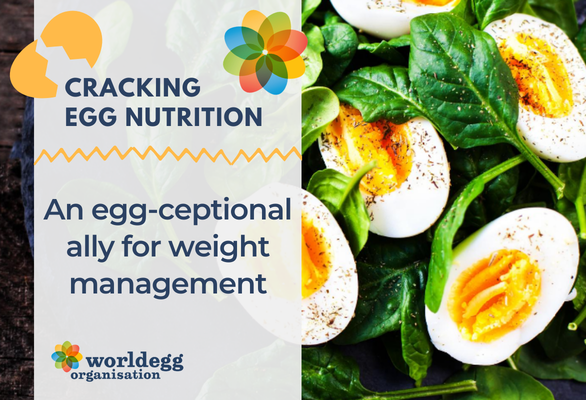
An egg-ceptional ally for weight management
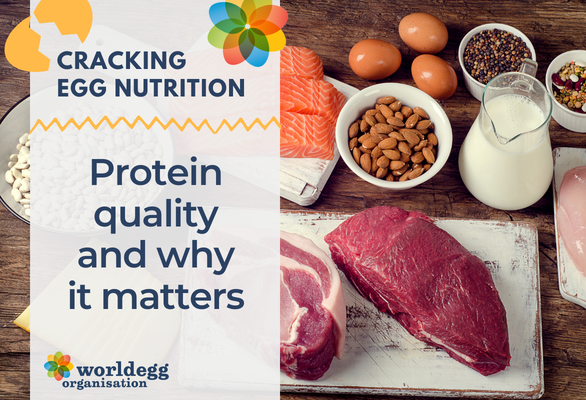
Protein quality and why it matters
